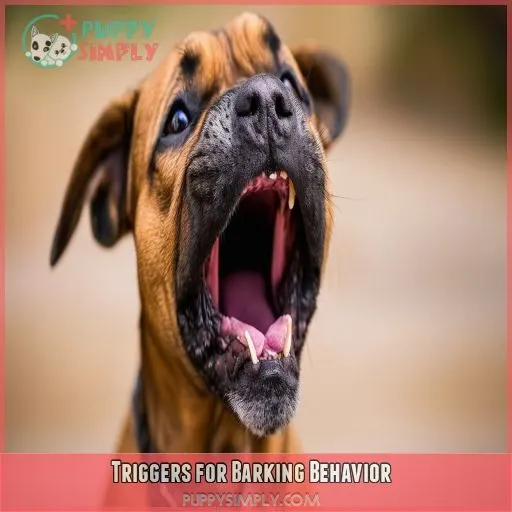This site is supported by our readers. We may earn a commission, at no cost to you, if you purchase through links.

In that regard, this article will allow you to know precisely why your bulldog is barking and provide proper techniques and strategies for controlling and reducing it. Learn how to train your dog correctly, enrich his environment, and deal with possible health problems—all of which have contributed to a peaceful home
Table Of Contents
- Key Takeaways
- Do English Bulldogs Bark a Lot?
- Bulldog Temperament and Personality
- Reasons Why Bulldogs Bark
- Triggers for Barking Behavior
- Training Techniques to Reduce Barking
- Environmental Enrichment for Bulldogs
- Barking Behavior in Bulldogs When Left Alone
- Barking Behavior in Bulldogs Around Other Dogs
- Barking Behavior in Bulldogs Due to Health Issues
- Barking Behavior in Bulldogs and Age
- Addressing Excessive Barking in Bulldogs
- Frequently Asked Questions (FAQs)
- Why do English Bulldogs bark so much?
- Do English Bulldogs bark when left alone?
- How to get an English Bulldog to stop barking?
- Are English Bulldogs quiet dogs?
- Are English Bulldogs good with other dogs?
- Do Bulldogs bark a lot?
- Why is my Bulldog barking so much?
- Do English bulldogs have breathing problems?
- How often should English Bulldogs be groomed?
- Are English Bulldogs suitable for apartment living?
- What type of diet is best for Bulldogs?
- Can Bulldogs participate in canine sports?
- How does one socialize an English Bulldog?
- Conclusion
Key Takeaways
- English Bulldogs are typically the strong, silent types of the dog world – they’re not known for being yappers or constantly barking up a storm.
- When these wrinkly wonders do decide to speak up, it’s usually for a good reason – boredom, anxiety, or trying to tell you something important (like "Hey, my food bowl is empty!").
- Just like people, Bulldogs can get a bit chatty if they’re not feeling their best. Keep an eye out for any unusual barking, as it could be your pup’s way of saying "I don’t feel so hot."
- With some patience, positive reinforcement, and maybe a treat or two, you can teach your Bulldog to use their "inside voice" and keep the barking to a minimum. After all, they’re lovers, not shouters!
Do English Bulldogs Bark a Lot?
English Bulldogs aren’t typically known for excessive barking. These lovable couch potatoes are generally quiet and laid-back. However, like any dog, they’ll vocalize when they need to communicate or feel threatened.
Your Bulldog might bark due to boredom, anxiety, or discomfort. Common triggers include strangers approaching the home, loud noises, or changes in their environment.
If your Bulldog’s barking becomes problematic, you can use positive reinforcement techniques, teach the "quiet" command, and provide adequate mental stimulation
Bulldog Temperament and Personality
English Bulldogs are known for being quiet and phlegmatic, with a temperament that typically makes them friendly with some strangers and politely reserved with others. Despite their easygoing nature, they’re tenacious and resolute, traits that can sometimes influence their barking behavior
Quiet and Phlegmatic
English Bulldogs are often lazy and stubborn, but they’re also gentle and loyal. Their quiet, phlegmatic nature makes them excellent for calm environments. Here are three key characteristics:
- Placid and Affectionate: Bulldogs generally thrive in peaceful settings.
- Aloof and Standoffish: They can be reserved around strangers.
- Protective and Aggressive: Despite their calm demeanor, they’re very protective
Friendly With Strangers (some)
When your English Bulldog meets strangers, their friendly greeting and social nature may shine through. Some Bulldogs display a polite response, welcoming new faces without reactive barking. However, triggers like fear or discomfort may prompt a different reaction. Understanding your dog’s cues can help manage these situations, ensuring a calm encounter and reducing unnecessary barking
Politely Reserved (some)
English Bulldogs are most likely to exhibit reserved interaction with strangers. While they’ll extend polite welcomes, their discriminating attitude towards friendliness suggests they don’t feel the compulsion to socialize at all times. They’ll display specific informational cues, such as a relaxed pose, particularly in unfamiliar companies. Good social etiquette and reward-type positive training can make them worry-free and healthy.
Tenacious and Resolute
English Bulldogs are tenacious and resolute, demonstrating remarkable stubbornness and dependability. Their tenacity often leads to challenges, like:
- Food possessiveness
- Persistence in learned behaviors
- Potential excessive barking
- Difficulty responding to commands
Despite these traits, they respond well to patient training. Use the quiet command and mental stimulation to manage their behaviors effectively
Reasons Why Bulldogs Bark
Understanding why Bulldogs bark is crucial for effective management. They may bark out of boredom, anxiety or stress, pain or discomfort, or even a dislike of their food
Boredom
Boredom is a common reason for your Bulldog’s barking. Bulldogs require exercise and mental stimulation to prevent boredom. Incorporate environmental enrichment and training into their routine.
| Activity | Frequency | Benefit |
|---|---|---|
| Walking | Daily | Physical exercise |
| Puzzle Toys | Several times a week | Mental stimulation |
| Treat Hunts | Weekly | Engages senses |
Anxiety or Stress
If your Bulldog barks due to anxiety or stress, it may be experiencing separation anxiety when left alone or a fear response to certain triggers like loud noises. Addressing the root causes, such as social isolation or boredom, through training, environmental enrichment, and medication if needed, can help reduce this type of barking behavior
Pain or Discomfort
Barking due to pain or discomfort can be a significant cause of noise in English Bulldogs. This might stem from injuries, illnesses, or even allergies.
If your Bulldog barks excessively, especially when it doesn’t usually do so, check for signs of discomfort or distress.
It’s essential to consult with your vet to rule out any medical issues causing this behavior
Dislike of Their Food
If your Bulldog dislikes their food, it can trigger barking. Food aggression or resource guarding might arise from food insecurity. Address this by introducing gradual dietary changes, ensuring mealtime management, and creating a calm dining environment. This proactive approach can help reduce barking related to food displeasure, ensuring a more peaceful mealtime for you both
Triggers for Barking Behavior
To manage your Bulldog’s barking, it’s important to identify and understand what triggers their behavior. By desensitizing them to these triggers and using counter-conditioning techniques, you can help reduce excessive barking
Identifying and Understanding Your Bulldog’s Triggers
Understanding your Bulldog’s triggers for vocalization is key to managing their behavior. Bulldogs often bark due to specific stimuli:
- Strangers approaching the home
- Loud noises or sudden movements
- Other animals, especially dogs
- Lack of attention or feeling neglected
- Changes in their routine or environment
Recognize these triggers to effectively address your Bulldog’s communication and maintain a calm household
Desensitizing Your Bulldog to Triggers
To desensitize your Bulldog to triggers, gradually expose them to the trigger at a low intensity. Increase the trigger’s presence gradually while ensuring your Bulldog remains calm. Pair the trigger with positive experiences, like treats or praise, to create a neutral or positive association. This behavior modification technique helps in your Bulldog’s management and reduces barking behavior over time
Using Counter-conditioning With Your Bulldog
Counter-condition your Bulldog by first finding out what the triggers are. Then, desensitize them gradually to the trigger by associating it with positive reinforcement in the form of treats or praise. Environments should be calm while one trains. This puts your Bulldog in a position where the association of triggers is positive.
Constant and patient training secures success in creating a happier, quieter pet. Do this to manage behavior effectively:
Training Techniques to Reduce Barking
To manage your Bulldog’s barking, focus on positive reinforcement, teaching the "Quiet" command, and redirecting their attention. Consistency and patience in applying these techniques are essential for success
Using Positive Reinforcement With Your Bulldog
Using positive reinforcement with your Bulldog can effectively reduce barking. Reward consistency is key. Try clicker training, which marks the exact moment your dog is quiet. Follow up with treat rewards and verbal praise to reinforce the behavior. Here are four steps:
- Use a clicker when silence occurs.
- Give a treat immediately.
- Offer verbal praise.
- Repeat consistently
Teaching the Quiet Command
Teaching the quiet command to your Bulldog involves consistent training and positive rewards. Start by saying "quiet" when your dog barks, then reward them with a treat once they stop. Repeat regularly.
| Step | Action | Reward |
|---|---|---|
| 1 | Say "quiet" | Immediate treat |
| 2 | Pet stops barking | Treat |
| 3 | Repeat | Reinforce with praise and treat |
Redirecting Your Bulldog’s Attention
Distract your Bulldog from barking by giving him some treats and involving him in activities he enjoys.
This could include playing fetch.
When your Bulldog starts barking, provide his favorite treat or get involved in the play with his favorite ball.
Not only will this stop the barking, but it will also reward good behavior and bring more attention and calmness in your Bulldog
Environmental Enrichment for Bulldogs
Providing adequate exercise and mental stimulation is critical for managing your Bulldog’s environment and reducing barking behavior. Creating a calm space with minimal distractions and managing their surroundings can also help keep them relaxed and less likely to bark excessively
Providing Adequate Exercise and Mental Stimulation
To keep your Bulldog mentally and physically stimulated, establish a consistent exercise routine. Take them on daily walks, play interactive games like fetch, and provide puzzle toys to challenge their problem-solving skills. Remember, Bulldogs don’t need excessive exercise, but a moderate amount is essential for their well-being.
- Incorporate daily walks and playtime
- Provide puzzle toys and interactive games
- Tailor exercise to your Bulldog’s needs
Creating a Calm Environment
Create an environment free of distractions and chaos around your Bulldog. Play soothing music to help subside the anxiety and tension so your dog feels safer. You can also create a quiet corner if needed, where they might go to retire themselves. Ensuring peace allows one to eliminate excessive barking totally and helps in the overall well-being of your dog.
Managing Your Bulldog’s Environment
Creating a calming environment isn’t complete without managing your Bulldog’s space effectively. Think about crate training as a safe space, providing outdoor time for exercise, and using calming aids to soothe anxiety. If you’re busy, hiring a dog walker can also reduce boredom and stress. All these elements help keep your Bulldog relaxed and happy
Barking Behavior in Bulldogs When Left Alone
When left alone, Bulldogs might bark due to separation anxiety or lack of training. Addressing these issues involves creating a calm environment and ensuring consistent, patient training
Separation Anxiety
Separation anxiety is a significant cause of excessive barking in English Bulldogs. Stressful reactions may come about when your Bulldog is left all by himself.
Treatments include the use of familiar scents and sounds to provide comfort. Ensure your Bulldog has toys to keep him preoccupied, or you can desensitize him progressively for being left alone.
Separation anxiety programs can promote a calmer, quieter home
Lack of Training
The Bulldog that isn’t well-socialized will bear with excessively loud barking whenever he’s left behind. In most cases, this behavior is fueled by inadequate exercise and a lack of clear boundaries.
If you set clear limits for your Bulldog, make his training regular, and provide him with enough physical and mental activities, it will significantly help reduce his barking.
After all, a well-trained Bulldog will be your calm and quiet companion
Barking Behavior in Bulldogs Around Other Dogs
When your Bulldog barks around other dogs, it’s often due to socialization issues, territorial behavior, or fear and aggression. Understanding these triggers and implementing proper training techniques can help manage and reduce excessive barking
Socialization
Proper socialization has much to do with how your Bulldog will behave concerning barking at other dogs. Therefore, socialize your Bulldog in various settings and under different stimuli. These are the areas of focus:
- Training in which your dog is feeling safe.
- Controlled interactions with well-behaved dogs.
- Reward with positive reinforcement if your Bulldog becomes calm.
This approach avoids excessive barking and ensures a balanced temperament.
Territoriality
Bulldogs bark partly because it’s a territorial instinct genetically carried over from breed history. Recognize the triggers and use behavior modification techniques to help manage barking. Help create a stable environment that’s consistent with the breed.
| Stimulus | Reflex |
|---|---|
| New dog nearby | Guard barking |
| Strange noises | Barking alertly |
| Territorial intrusion | Defensive barking |
| Owner’s reaction | Imitation |
Your Bulldog’s environment can hugely influence its territorial instincts.
Fear or Aggression
Bulldogs may bark out of fear or aggression, stemming from their genetics, breed history, and dominance. When faced with unfamiliar dogs, their barking might arise as a fear response or an assertion of territorial behavior. Understanding these triggers helps in managing and training your Bulldog to reduce excessive barking and maintain a peaceful environment
Barking Behavior in Bulldogs Due to Health Issues
Barking in Bulldogs can result from health issues like respiratory and skin problems. You should be vigilant for signs of discomfort, as addressing these issues can help manage excessive barking
Respiratory Problems
Bulldogs often have respiratory system issues due to their brachycephalic nature, which can lead to excessive barking from discomfort. Their short snouts make breathing laborious, exacerbating health concerns. Serious food possessiveness and stubbornness can worsen this, resulting in anxiety-driven barking. Being vigilant about their respiratory health is essential for managing their barking behavior effectively
Skin Problems
Skin problems in Bulldogs, like skin irritation, rashes, dry patches, and inflammation, can cause frequent itching. This discomfort often leads to increased barking as your Bulldog tries to communicate their distress. If you notice excessive scratching or redness, consult your vet for appropriate treatments to alleviate their symptoms and reduce the associated barking behavior
Barking Behavior in Bulldogs and Age
Understanding how English Bulldogs’ barking behavior varies across different life stages can help you manage it effectively. Puppies often bark out of curiosity or need for attention, adults may bark due to boredom or anxiety, while senior Bulldogs might bark because of discomfort or health issues
Puppy Barking
Puppy barking is often a sign of their need for attention, discomfort, or curiosity. Be patient during puppy training, focusing on crate training and leash training. Regular socialization helps too. Provide toys and distractions to minimize boredom. Early potty training can prevent barking due to discomfort. Addressing these needs early fosters a calm, well-adjusted English Bulldog
Adult Barking
The most common factors that make or will trigger adult barking in Bulldogs are boredom, anxiety, and environmental reasons.
Behavior modification is challenging due to their tenacious nature.
Keep them busy through regular exercise and food puzzle toys. Combine this with a routine that will help them not get bored.
Consider enrolling your dog for professional training in the case of excessive barking to deal with such problems effectively or to ensure a harmonious living environment between you and your bulldog
Senior Barking
As Bulldogs age, senior barking often increases due to physical discomforts or canine cognitive dysfunction. Geriatric barking can stem from confusion or anxiety, common in older dogs. Routine vet checkups are essential to rule out health issues. Creating a serene environment, combined with consistent, gentle training, can help manage age-related barking effectively
Addressing Excessive Barking in Bulldogs
To manage your English Bulldog’s excessive barking, consider consulting with a veterinarian to rule out any underlying health issues. Professional training and behavior modification techniques can also be effective in reducing barking and improving overall behavior
Consulting With a Veterinarian
In cases of excessive barking, it’s Always crucial to consult a veterinarian who can:
- Assess for medical issues: Pinpoint any occult medical problems that are affecting your Bulldog.
- Prescription of medicines: Medicate prescription options to help manage anxiety, if necessary, or any other condition.
- Refer to a specialist: Referral to a behavior specialist or certified veterinary behaviorist for detailed behaviorist consultation
Seeking Professional Training
Seeking professional training can make a significant difference in managing your Bulldog’s excessive barking. Consider a behaviorist consult or phone consults with experts. Professional trainers will help customize strategies to your dog’s needs, ensuring consistency and effectiveness. Additionally, regular visits to a dog park for social play can help reduce stress and improve overall behavior
Implementing Behavior Modification Techniques
Implement behavior modification techniques with positive reinforcement and counter-conditioning. Reward your Bulldog for quiet behavior and desensitize them to triggers gradually. Use short sessions to avoid overwhelming them. Environmental enrichment, like puzzle toys and treat balls, can also help. Consistent training and a calm, stimulating environment will reduce excessive barking efficiently
Frequently Asked Questions (FAQs)
Why do English Bulldogs bark so much?
English Bulldogs bark frequently due to boredom, seeking attention, or specific needs. They may also bark after exercise or for fun. Their stubborn nature and strong will can contribute to persistent barking behavior
Do English Bulldogs bark when left alone?
Coincidentally, English Bulldogs often bark when left alone due to anxiety and loneliness. Ensuring a safe, enriched environment and using tools like Adaptil diffusers or music can help mitigate this behavior effectively
How to get an English Bulldog to stop barking?
To stop your English Bulldog from barking, use a spray bottle with water, firmly say "NO," and redirect with a toy or bone. Make sure they get sufficient exercise and mental stimulation to reduce boredom
Are English Bulldogs quiet dogs?
About 60% of English Bulldog owners report that their dogs are generally quiet. English Bulldogs tend to be reserved and don’t bark excessively, making them ideal for apartment living and those who prefer a calmer pet
Are English Bulldogs good with other dogs?
Generally, English Bulldogs are good with other dogs, especially if they grow up together. Their amiable nature will guarantee that they get along ideally, but early socialization is crucial to ensure that they relate and minimize the potential problems that might be encountered.
Do Bulldogs bark a lot?
Bulldogs generally don’t bark a lot. They tend to be quiet, friendly, and reserved. However, they may bark for specific reasons like boredom or seeking attention. Proper training and engaging activities can help manage this behavior
Why is my Bulldog barking so much?
Your Bulldog’s incessant barking might be due to boredom, seeking attention, or frustration. Addressing these issues with ample mental stimulation, consistent training, and enriching activities should help curb excessive barking behavior
Do English bulldogs have breathing problems?
Yes, English Bulldogs often have breathing problems due to their compromised respiratory system. Their short snouts can lead to snorting, snuffling, wheezing, and loud snoring. Veterinary care is essential to manage these issues effectively
How often should English Bulldogs be groomed?
You should groom your English Bulldog weekly to manage shedding and maintain a clean coat. Use a soft brush and check for skin issues. Regular grooming sessions help keep them comfortable and healthy
Are English Bulldogs suitable for apartment living?
Yes, the English Bulldog can be an apartment dog. Their nature is calm, while their size is moderate; additionally, they’ve a low exercise requirement, thus making them perfect for an apartment setting. Check regular training and take good care of your health issues, and you’ll have excellent home life.
What type of diet is best for Bulldogs?
Feed your Bulldog a good quality, high protein diet, correctly matched to his age and degree of activity. Ensure that the ingredients are easily digestible, without fillers, with supplements for joint health. Always consult with your vet for advice on the situation at hand.
Can Bulldogs participate in canine sports?
You’ll be pleased to know Bulldogs can participate in various canine sports. Their strength and determination make them well-suited for activities like weight pulling and nose work. However, you’ll need to be mindful of their physical limitations and overheating risks
How does one socialize an English Bulldog?
Start socializing your English Bulldog early. Expose them to various people, pets, and environments. Use positive reinforcement with treats and praise. Keep interactions brief and positive. Gradually increase exposure as your Bulldog becomes more comfortable. Consistency is key
Conclusion
Your English Bulldog is a gentle giant, where this bark is more of a whisper than a roar. Even though English Bulldogs aren’t great barkers, it’s essential to understand their vocalizations.
You have learned about their temperament, why they bark, and some efficient management techniques. This means avoiding or minimizing triggers, applying training strategies, taking proper care of your dog, and reducing excess barking as much as possible.
Keep in mind that your Bulldog uses his bark to communicate with you. With patience and the right approach, you’ll create a harmonious environment for both you and your lovable companion
















